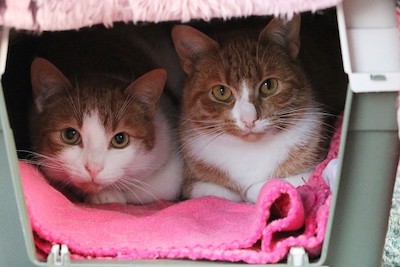My Pet World: When a Dog Is Not Keen on Being Picked Up
And more answers on living with and loving our pets

In this edition of ‘My Pet World,’ animal expert Cathy M. Rosenthal gives advice on what to do when a dog hates being picked up, responds to a reader who has issues with the praise word “bingo,” and suggests a remedy for a hesitation to move cats cross country.
Dear Cathy: I have a 9-month-old male cairn terrier who runs from me when I need to pick him up. I’ve tried doing it while kneeling so I don’t tower over him, but to no avail. Once I am able to pick him up, he’s fine. Is this typical of some dogs and will he grow out of it?
– Terri, Rocky Hill, Connecticut
Dear Terri: If you think about it, being picked up is not something a dog should really be used to; being several feet off the floor is not a normal position for a dog to be in. Naturally, this can make some dogs nervous.
While there is no guarantee your dog will ever enjoy being picked up, you can help him accept it. Do each of the following steps for a few days before progressing to the next step.
First, act like you’re going to pick him up, but give him a treat instead. Second, go to pick him up by putting your hand under his body, but don’t actually pick him up. Just give him a treat, remove your hand, and walk away. Next, offer him a treat, then pick him up and keep offering treats until he is on your lap. Finally, hold out a treat when picking him up while standing, again offering him treats until he is calm. At this point, he should be looking for the treat and therefore less concerned about being picked up. This training is meant to distract him so in time he’ll forget to be nervous about being picked up.
Dear Cathy: I read your column regularly and enjoy the articles. But I have one thing that drives me crazy and that is your use of the word “bingo” as an example for a reward word. Isn’t there any other word you can think of or use as examples, such as “perfect,” “cheerios,” or even “good boy/girl”? Your advice is usually very good, but maybe you could change this up a bit from time to time.
– Pat, Las Vegas, Nevada
Dear Pat: Your letter made me laugh. I am sure if I gave you a tasty treat every time I said “bingo,” you might feel differently!
As you point out, reward or marker words can be any word, except for words you generally use in conversation so as not to accidentally trigger your dog into wanting a treat. So, “cheerios,” “awesome,” “way to go,” “impressive,” “wonderful,” to name a few, are great words to use if you don’t say them much, don’t like the word “bingo,” or have multiple dogs, because each needs their own reward word.
The repetition, however, is intentional. I use this particular word repeatedly because I think people are more likely to recall the advice with an interjection-type word like “bingo,” rather than a general word like “awesome.” For this reason, I can’t drop the word entirely, but for you, I will try to mix it up every once a while. Thanks for writing!
Dear Cathy: I’m considering moving seasonally from my home, crossing from South Florida to Michigan in the spring and then back again in late fall. I am worried that this will be difficult with my two senior cats and have been going back and forth about how to do this. Any suggestions?
– Mindi, South Florida
 Dear Mindi: Most cats don’t mind car travel if they are used to riding in a car. If your cats aren’t used to car travel, get two cat crates that they can stand up and move around in or a bigger crate if they like to sleep together. Put in comfy beds that your cats will enjoy sleeping on. Then, take them for a drive in these crates a few times a week so they get used to being in a car.
Dear Mindi: Most cats don’t mind car travel if they are used to riding in a car. If your cats aren’t used to car travel, get two cat crates that they can stand up and move around in or a bigger crate if they like to sleep together. Put in comfy beds that your cats will enjoy sleeping on. Then, take them for a drive in these crates a few times a week so they get used to being in a car.
During your cross-country trip, feed them lightly before the trip and then give them a full meal when you end your day’s driving. Let them out of their crate midday to use the litterbox and access water. Make sure you are inside your car and the doors are locked when you do this, so your cats have no chance to escape. (You also can attach a leash to your cat’s collar to prevent them from bolting.) Do not open any doors until both cats are back inside their carriers.
The good news is your senior cats will likely sleep most of the trip. So get them used to car rides first and they will be ready for longer road trips.
Cathy M. Rosenthal is a longtime animal advocate, author, columnist, and pet expert who has more than 25 years in the animal welfare field. Send your pet questions, stories, and tips to cathy@petpundit.com. Please include your name, city, and state. You can follow her @cathymrosenthal.
© Tribune Content Agency, LLC.



